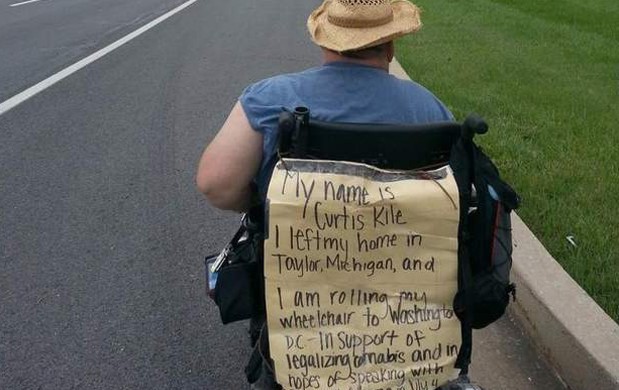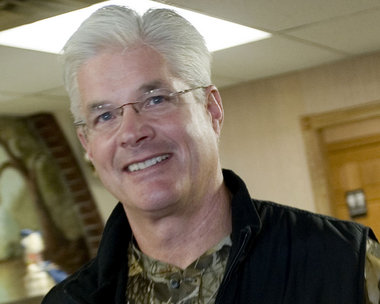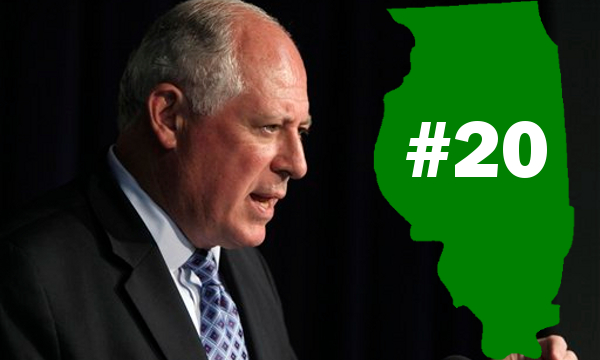
Nov 19, 2014 | Health Benefits of Marijuana, Legalization, Michigan Medical Marijuana Act
By Michael Komorn
In dramatic fashion, 52-year-old Curtis Kile, who is afflicted with cerebral palsy is rolling his wheelchair to the White House to advocate for medical marijuana users.
Kile departed his Taylor home June 14 and inched his way down sidewalks, through traffic, across mountains and through cities and small towns from Michigan to Washington.
He intends to tell President Obama, face-to-face, that marijuana should be legalized in the United States. He believes sick people should have safer and cheaper access to the drug that he believes has been critical to his health.
(Related: Arizona Supreme Court Sets Example for Michigan, Other Medical Marihuana States )
“The alcohol industry doesn’t want it legal, and the pharmaceutical and the tobacco companies don’t want that, because it’s going to bite into their profits.
“It’s the money that’s stopping it, and that’s wrong,” he said.
Whether Kile is ever granted an audience with the President or not, remains to be seen, but there is strong symbolism in his will.
(Related: 10 Police Raids Gone Wrong)
“His story has inspired people all across the country,” said Rick Thompson, Flint-based editor of the Compassion Chronicles, an online news source for the cannabis community in Michigan. Thompson wrote about Kile last week.
“I don’t know that he’ll get to speak to the president, but there’s no denying his passion,” added Southfield attorney Michael Komorn, host of Planet Green Trees, a weekly Internet interview show about marijuana.
(Related: What Did I Just Get Charged With?)
The man on a mission has long depended on marijuana to control the severe muscle spasms and other symptoms his condition. His sole desire is for sick Americans to have low-cost, legal access to the medicine they need.
Contact Michigan Medical Marijuana Attorney Michael Komorn at 800-656-3557 for a free case evaluation, today.
Read more: http://www.freep.com/article/20130701/NEWS02/307010012/Taylor-man-in-wheelchair-rolls-to-Washington-on-marijuana-crusade

Nov 18, 2014 | Michigan Medical Marijuana Act
By Michael Komorn
Last week, I came across a story in the Huffington Postthat detailed the suffering of two patients who got caught up in the conflict between State and Federal guidelines on Medical Marijuana. The story of the two patients profiled in the piece were all too familiar to me, and anyone who has followed the evolution of Michigan’s Medical Marijuana Act. A young man who was injured in the line of duty, ironically on a drug war mission in Latin American, was raided by federal agents after they learned that he was cultivating marijuana (legally under California State Law) for himself and other patients. He was prescribed morphine and other strong opiates to treat the chronic pain he experienced after over 15 failed spinal surgeries, but never had to increase his dosage because of his use of medical cannabis. When he learned that if convicted, he would not be able to use his current medications, the prospect of a life of pain and suffering behind bars led him to flee to Canada to seek asylum under their federal policy toward medical marijuana. Ultimately, he was arrested by Canadian law enforcement and handed over to US Marshals who then transported him from the hospital, catheter still attached, and transported him to jail, where he was offered little more than ibuprofen to treat his pain. During his stay in jail, he experienced withdrawal symptoms as those who have been taking morphine for 16 years would expect after being cut off cold turkey. He complained of back, urinary and prostate pain, and spoke to his attorney through grimaces behind the pale screen separating him from the outside world. He spent almost a week in jail without medication until he was finally released on bond and was able to resume his normal pain treatment regimen. In Michigan, hundreds of stories similar to this have taken place or are currently unfolding. I have represented clients suffering from cancer and other life threatening illnesses who find themselves fighting for their freedom in court, when they should be putting all their energy into fighting their illness. The people of Michigan did not pass the Medical Marijuana Act to make it easier for law enforcement to put more people in jail, they passed it so that people looking for the best treatment for their debilitating illness would be safe to pursue any option their doctor recommended. People seeking treatment in hospitals have been denied and told to go to alcoholics anonymous because of the THC found in their blood. When over 50% of Americans support legalizing cannabis and we still have people being jailed and denied care at our hospitals, can we safely say that the United States is a model for Democracy across the globe?

Nov 18, 2014 | Legalization, Michigan Medical Marijuana Act
On Aug. 14, citizens, prosecutors, and law enforcement officers will all descend upon the Grass Lake Township hall to discuss the pros and cons of decriminalizing marijuana in Michigan. State Republican Mike Shirkey has scheduled the town hall meeting in hopes of furthering the discussion of the medical benefits and societal risks of marijuana use as well as gaining support for HB 4623 which would decriminalize marijuana use for adults.
“Are we forcing law enforcement to police and jail recreational marijuana users instead of using time and money that should be going to battle our meth lab epidemic?” Shirkey, R-Clark Lake, said in a statement. “Are we limiting reasonable options to end-of-life pain management by putting excessive restrictions on medicinal marijuana?”
Joining the discussion will be Dem. Jeff Irwin, author of HB 4623 as well as members of Law Enforcement Against Prohibition (LEAP). Shirkey expects a good turnout, especially in light of the recently submitted petition to decriminalize marijuana in Jackson.
The town hall will be held at 5 to 7 p.m. Wednesday, Aug. 14, at the Grass Lake Township Hall, 373 Lakeside Drive.

Nov 18, 2014 | Legalization, Michigan Medical Marijuana Act
On Thursday, August 1, 2013, Illinois became the 20th state to enact Medical Marijuana Legislation. The law goes into effect on January 1st, but until then the House and Senate will have an opportunity to pick through the already restrictive bill, which will expire after 4 years and will need to be re-voted upon. Under its current format, the law would permit patients to possess up to 2.5 ounces every two weeks. Unlike in Michigan, Illinois’ bill specifically addresses the issue of dispensaries, permitting 22 grow operations that will supply the 60 dispensaries permitted to distribute the final product.
(RELATED: People V Green)
In order to become a patient, one must already have and existing doctor-patient relationship unless the individual is a veteran. Veteran’s will be exempt from this clause due to the Veteran’s Affairs’ strict anti-cannabis stance, and a loop-hole in the law provides vets an opportunity to get a prescription from someone other than their primary caregiver. Additionally, the profits attained by growers and dispensaries will be subject to a “privilege tax,” and all sales made by caregivers and dispensaries will be taxed at 7%. Patients will be taxed 1% for each purchase, which is similar to the tax on other pharmaceuticals.
(RELATED: People V McQueen)
Another important factor in Illinois’ Marijuana law is that there are no restrictions on driving. Hundreds of patients in Michigan have found themselves in court due to Michigan’s strict “Zero Tolerance” stance toward driving with any amount of a controlled substance in your system. We will follow this story closely and bring you updates as it continues to unfold.

Nov 18, 2014 | Michigan Medical Marijuana Act

(Update: Panel Approves PTSD)
A new panel is expected to consider petitions aimed at adding autism, asthma, insomnia and post-traumatic stress disorder to the list of debilitating conditions to Michigan’s medical marijuana law. Many believe this panel should have convened much sooner to consider these conditions, but due to mismanagement it never came to fruition.
Though the panel was created in 2009, no meeting took place until 2012. That panel considered adding Parkinson’s and PTSD, but was dismantled in April because LARA deemed that the members were not appointed in accordance with administrative rules.
Though PTSD has been on the list to be considered before, the fact that the previous panel had not been created in accordance with the rules prevented it from being added. There are also concerns that this could provide a loop-hole for veterans to be added to the list, as the VA is staunchly opposed to any use of the drug.
If the panel does recommend adding ailments, LARA would then be required to post them online, hold a public hearing within 60 days and forward public comment back to the panel for further consideration. After that, the department director must make a final determination within 180 days of the date a petition is filed.

Nov 18, 2014 | Michigan Medical Marijuana Act
 (Updated from 8/6/2013)
(Updated from 8/6/2013)
The Medical Marijuana Act Review Panel of 9 convened yesterday to consider adding asthma, autism, and PTSD to the list of qualifying conditions for the medical use of marijuana. The panel, which has been subjected to harsh criticism for mismanagement and lack of productivity in the past, decided that autism and asthma would not be accepted, even though research keeps mounting that medical marijuana helps with both of these ailments.
(Related: Top Doctor Reveals the Truth about Marijuana’s Effect on the Lungs)
The good news is, PTSD has advanced beyond the first round with the panel voting 7-2 in favor. LARA is now required to post the conditions online, hold a public hearing within 60 days and forward public comment back to the panel for further consideration. After that, the department director must make a final determination within 180 days of the date that the petition is filed. The head of LARA, the state agency responsible for appointing the panel and administering the medical marijuana program, will have final say on whether to add PTSD to the list of debilitating conditions.







